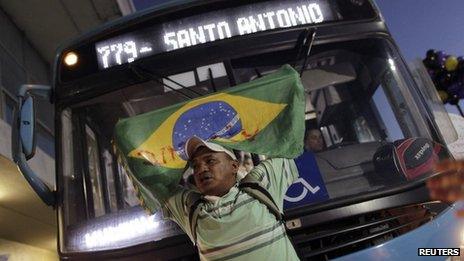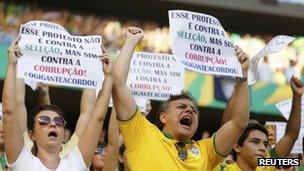‘Astonished’ Brazil wrestles with wave of protests
- Published

Events are moving quickly in Brazil and the political leadership seems uncertain how to respond, outpaced by a movement two steps ahead on social media.
One government minister even acknowledged Brazil was watching "astonished" by the current wave of protests.
President Dilma Rousseff resorted to praising peaceful demonstrators for making democracy stronger.
And now in Brazil's two biggest cities, Sao Paulo and Rio de Janeiro, decisions to increase fares on buses and metros - which sparked the protests - have been reversed.
It will be seen as a victory for the hundreds of thousands of Brazilians who took to the streets.
The question this change of heart raised was: would this be enough to defuse the current situation, allowing for the dialogue that the politicians say they want?
The answer seemed to come almost immediately - young people pouring on to the streets of Sao Paulo's landmark street, Avenida Paulista.
In Niteroi, in Rio de Janeiro, Brazilian TV showed a group of young men trying to topple an empty bus.
With continuing violence, sometimes with football fans and pedestrians caught up in it and rubber bullets flying, some kind of tragedy seems perilously near.
The mayors of Sao Paulo and Rio de Janeiro have made their big move along with several other city authorities.
But the controversy over bus and metro fares was only the issue that got the marchers on to the streets - it all seems much bigger than that now.
Conciliatory note
The objectives of this diverse protest movement are very broad, such as demanding better education and health services.
A sluggish economy and inflation that is affecting the lives of ordinary Brazilians every day can be added to the mix.
Politicians with high salaries giving jobs and flights to relatives are widely scorned.

Some protesters held up signs during Brazil's match against Mexico on Wednesday
Inequality and the huge cost of hosting the World Cup and the Olympics are key issues raised by demonstrators alongside corruption, crime and police brutality.
On that front, the dynamic of the protest has been changed by the fact that Brazil is already in the international spotlight - hosting the Confederations Cup, the warm-up tournament for next year's World Cup.
Both the government and the demonstrators seem aware of what is at stake.
In the north-eastern city of Fortaleza, even with the Brazilian team playing, protesters tried to reach the stadium and clashes with police followed, tear gas again hanging in the air.
It seems a long way from when Brazil celebrated a "coming of age" moment when it was awarded such prestigious international sporting events.
Little wonder President Rousseff seems to think the best strategy is to sound conciliatory.
She promised to listen to the voices from the street, and with just over a year to go to the next presidential election she has a compelling reason to do so.
It was perhaps not surprising that, confronted with an escalating crisis, she went to Sao Paulo for talks with her predecessor as president, Luiz Inacio Lula da Silva, well regarded for his people-friendly manner.
However, such is the scale of the protest currently taking place in Brazil that words may be not enough.
The leaders of South America's largest country may well have to come up with other compromises to appease the movement that has hundreds of thousands and powerful forces on the internet behind it.